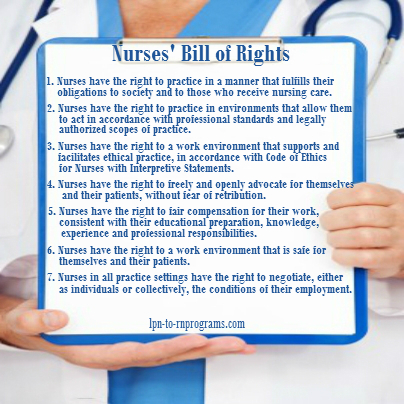American Nurses Association – Nurses’ Bill of Rights Explained
Nursing is a profession that deals with the lives of all people. A single mistake would definitely bring a significant impact to your patient’s health or even bring a lifetime effect to your career as a nurse. You may even lose your hard-earned license once you harm your patients.
On the other hand, with the demands of our profession, we are also protected by the rights granted to us. Hence, we should know and understand these workplace rights in order to protect ourselves as well as our patients. We should always uphold these rights and keep them in our mind and heart as we do every single nursing care.

Seven Workplace Rights for Registered Nurses According to American Nurses Association
- Nurses have the right to practice in a manner that fulfills their obligations to society and to those who receive nursing care. Before you become a registered nurse, you were trained as a student. As you go through this phase, you have experienced how to become a staff nurse with the supervision of a clinical instructor. You were taught how to do different nursing interventions, what are the legal responsibilities of a nurse and how to handle complex situations as you start your career. Hence, the knowledge and skills you have gained from this should always be applied as you render nursing care to your patients.
- Nurses have the right to practice in environments that allow them to act in accordance with professional standards and legally authorized scopes of practice. As you start your career as a nurse, you are now facing a bigger responsibility. You are now dealing with the lives of your patients and with a single mistake, you may possibly put your patient’s life at risk. Hence, you must be informed about the legal scopes of the nursing profession. You should know your legal responsibilities and the repercussions if you violated any of these.
- Nurses have the right to a work environment that supports and facilitates ethical practice, in accordance with Code of Ethics for Nurses with Interpretive Statements. You must know the ethical principles behind each action you take and you will take. A simple action such as telling your colleagues about your patient’s case is already a violation of an ethical principle (principle of confidentiality).
- Nurses have the right to freely and openly advocate for themselves and their patients, without fear of retribution. As patient advocates, nurses protect the rights and welfare of their patients. We ensure safety and promotion of optimum health. Through this, we are able to provide efficient and cost-effective nursing care.
- Nurses have the right to fair compensation for their work, consistent with their educational preparation, knowledge, experience and professional responsibilities. The demands of our profession push some of us to quit our job. This may be due to heavy workload, extended duty hours, mandatory overtime and sometimes unjust compensation. We cannot deny that one of our primary reasons why we took up nursing is that it is considered as a high-paying and recession-proof job. Moreover, before we obtain our license, we have gone through a rigorous process. Hence, as we finish our studies, we also expect to be rewarded.
- Nurses have the right to a work environment that is safe for themselves and their patients. Nursing profession predisposes us to different health hazards such as communicable diseases and stress. We are always prone to contract diseases as we handle and care for our patients. Hence, as part of our workplace rights, we also need to protect ourselves by wearing protective equipment and observing different precautionary measures. On the other hand, we are also responsible to ensure patient safety. We need to eliminate or minimize the risks and hazards to their health.
- Nurses in all practice settings have the right to negotiate, either as individuals or collectively, the conditions of their employment. Like any other employee, nurses have the right to fair compensation. They should also be allowed to join different organizations to protect their rights and promote professional growth. They should be given the chance to defend what is rightfully theirs without the fear of losing their job. With this, if they think that the terms of their job seem to be unfair, they should be allowed to freely voice out all their concerns.
The rights mentioned above should always be applied in all workplace settings and working conditions even outside the hospital institution. Given the fact that these are our rights, we should never be afraid to defend it. However, as we do this, the first thing that we need to do is to weigh the situation and know the possible consequences of our actions. Hence, we should never be aggressive in defending them because there are instances that these rights may be waived. Most importantly, we should keep in mind that we are not given the right to abuse these rights.


Comments
American Nurses Association – Nurses’ Bill of Rights Explained — No Comments
HTML tags allowed in your comment: <a href="" title=""> <abbr title=""> <acronym title=""> <b> <blockquote cite=""> <cite> <code> <del datetime=""> <em> <i> <q cite=""> <s> <strike> <strong>